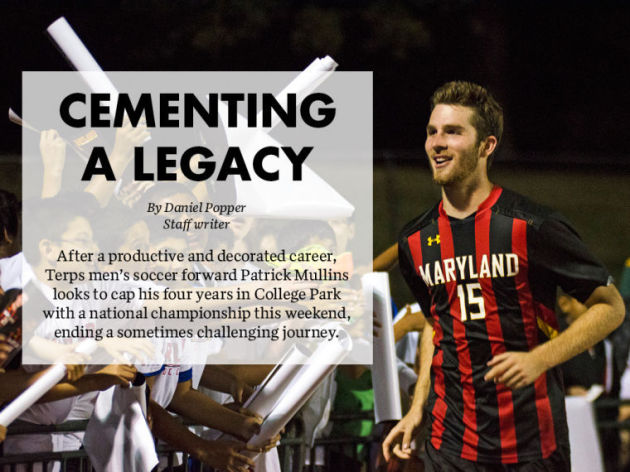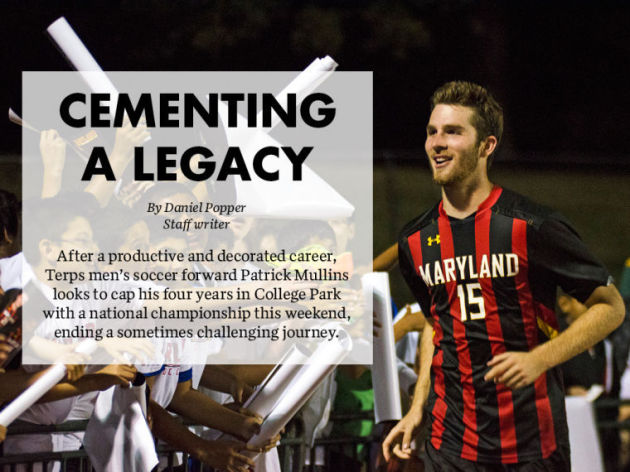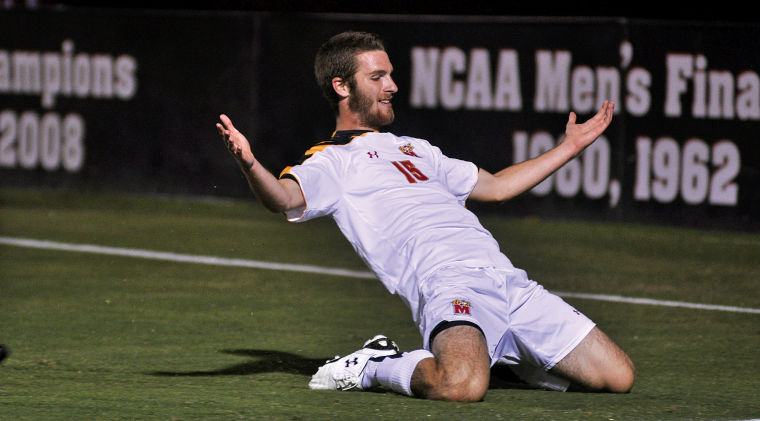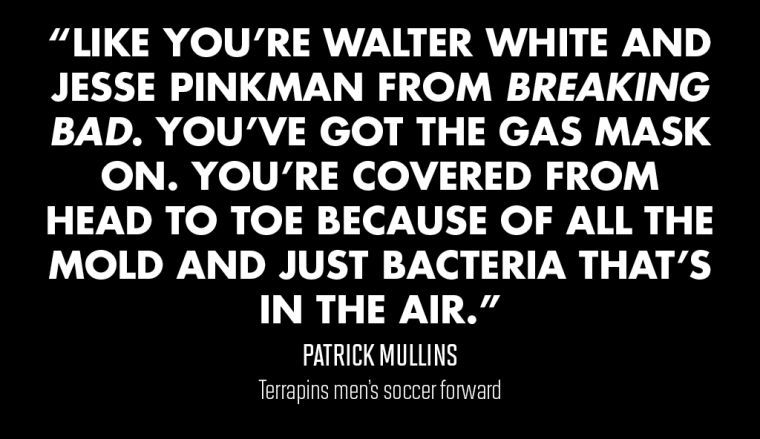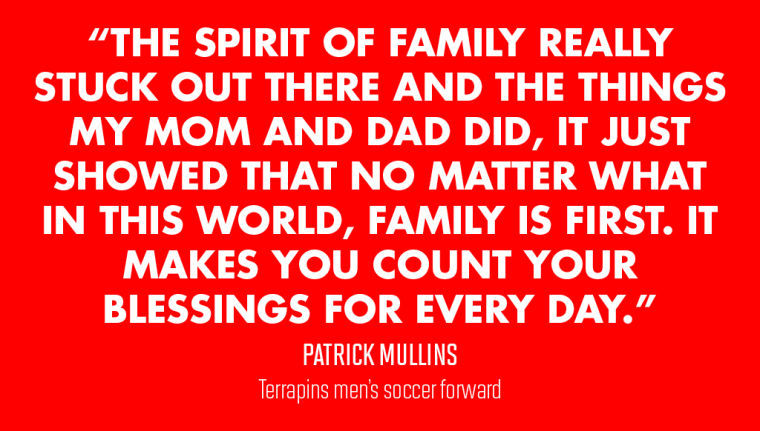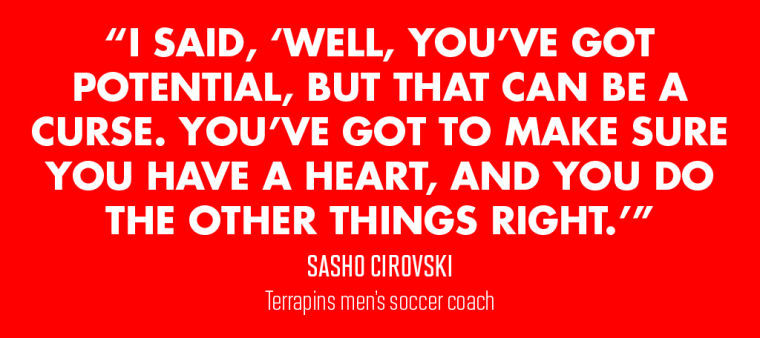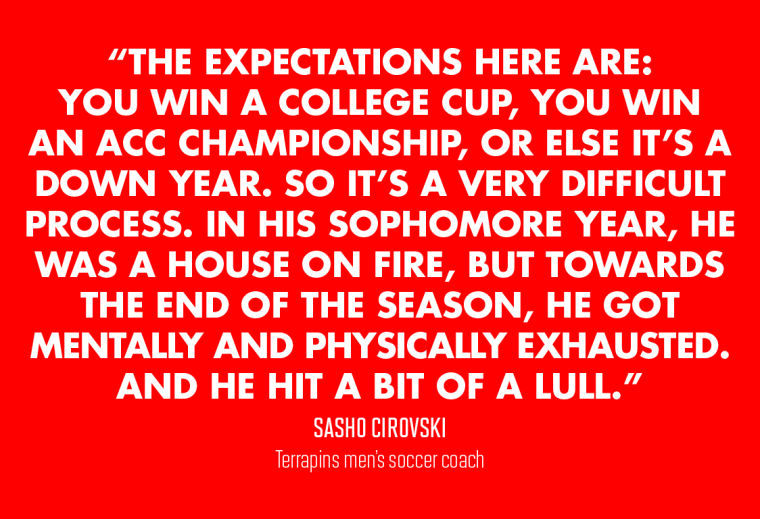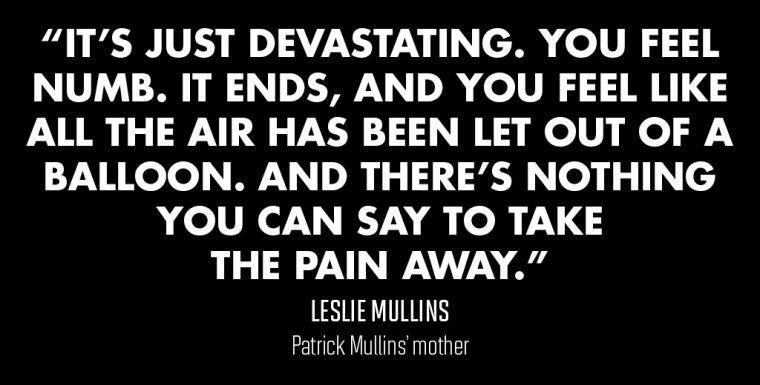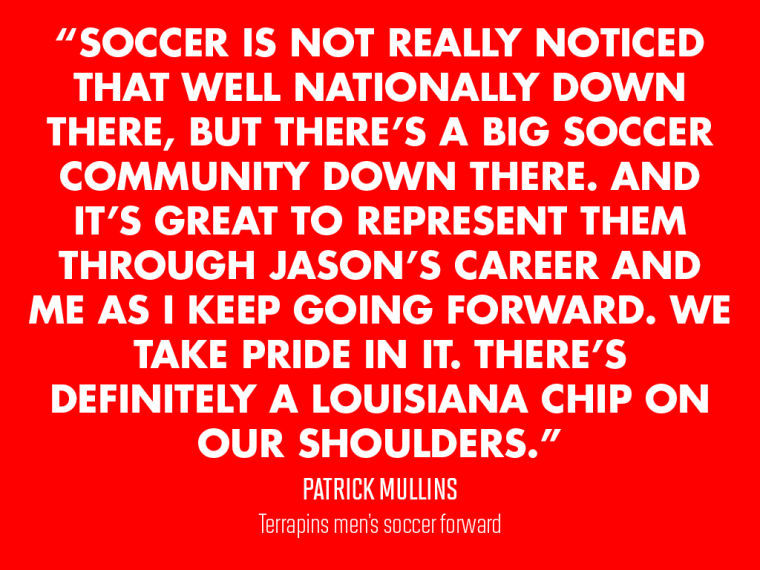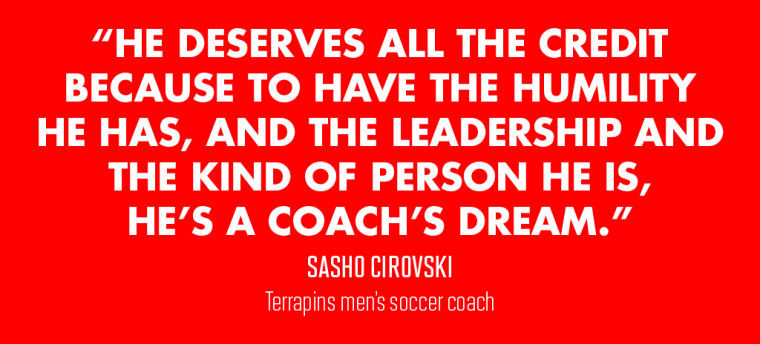IT’S HARD TO FIND anyone with something bad to say about Patrick Mullins.
His Terrapins men’s soccer teammates look up to their undisputed leader and top goal scorer. His coaches are amazed by his openness to criticism and staunch commitment to improving. His opponents respect his competitive edge and nose for the goal. His fans chant his name during every home game at Ludwig Field.
Don’t remind Mullins of any of that, though. Despite his long list of recognitions — the 2012 MAC Hermann Trophy, an National Soccer Coaches Association of America First Team All-American nod and two All-ACC first-team honors, to name a few — he believes there’s still a long way to go before he truly deserves the legacy he’ll undoubtedly leave behind.
A national championship would transcend any accolade he’s garnered during his time in College Park. And this weekend, he’ll have his final opportunity to capture what has eluded him.
The No. 5-seed Terps will take on No. 8-seed Virginia tonight at PPL Park in Chester, Pa., in the NCAA tournament semifinals. Mullins led his team to the same round last year, but fell in heartbreaking fashion to Georgetown in penalty kicks in Hoover, Ala.
Regardless of the outcome this weekend at the College Cup, Mullins said he will “absolutely” be content with his time as a Terp — a career that will long remain one of the best in program history. His 44 goals rank third all-time behind Cliff Krug (45) and fellow Louisianan Jason Garey (60), the only other Terp to win the Hermann Trophy.
Mullins’ journey to college soccer’s pinnacle has not been easy, though. It began in New Orleans with a dream of playing professional soccer and has been littered with obstacles and setbacks along the way, including the loss of his home when he was an eighth grader.
But each time a challenge stood in his way, Mullins did the only thing he’s ever known. He moved forward, continued growing and never stayed satisfied.
The result has been his development not only into the nation’s most elite attacker, but more importantly, into the fierce leader coach Sasho Cirovski said will provide the standard for his program for years to come.
“He’s grown every year, in him understanding what leadership is to his taking on that role to heart,” Cirovski said. “Leadership starts with being a good role model and doing things right, and he does virtually everything right. I know he would hate to hear me say that because he knows he’s not perfect and he knows he wants to get better. But if you cut him a little bit of slack, he’s the perfect leader.”
STRONGER THAN THE STORM
Three months after Hurricane Katrina forced him and his family to evacuate to Brookhaven, Miss., two hours north of New Orleans, 13-year-old Patrick Mullins returned to his city for the first time since the storm.
(click to enlarge)

Mullins quote 1
“Like you’re Walter White and Jesse Pinkman from Breaking Bad,” Mullins said. “You’ve got the gas mask on. You’re covered from head to toe because of all the mold and just bacteria that’s in the air.”
He walked into his house — which sat just two blocks from one of the 53 levees that breached in the city during the storm — to find the desk from his room was in the kitchen. It had floated there when the house was filled with between 7 and 10 feet of water.
“That was definitely an unforgettable experience,” Mullins said.
Homeless, Mullins and his older brother, Andrew, rallied around their parents, Walter and Leslie, who had a daunting task: Find a place to live, an education for their children and some semblance of life as it was before disaster struck.
There wasn’t much flexibility in their decisions, though. Immediately after the storm, businesses from New Orleans began relocating around the state, forcing their employees to follow.
“Your employer basically said, ‘We’re reopening in Baton Rouge, and you need to be there in week,’” Leslie Mullins said.
There were no apartments or other potential housing options to lease in Baton Rouge, La., though, because of the overwhelming number of people displaced farther south in the state. Luckily, Leslie’s college roommate and longtime best friend had a house in the state capital and opened her door to the family, which lived there for the next three months.
Patrick and Andrew, a junior at the time, could not return to school in New Orleans because Jesuit High Schools, covering grades eight through 12, remained flooded. The schools in Baton Rouge were already too crowded with the influx of relocated students, so they began attending St. Thomas Aquinas in Hammond, La., which Leslie jokingly said had been converted into a school for “refugees.”
The brothers made the hour-long drive every day from Baton Rouge to Hammond for classes along with four other soccer players Andrew’s age. They continued this routine until the end of the first semester in December.
“I’m sure [Patrick] had lots of humor and education on that carpool,” Leslie said.
Jesuit announced it would be opening back up for the winter semester in January. The family had yet to find a new house, but Leslie knew her boys would be returning to their school. Their classmates were there. Their soccer teams were there. It was their home, and she wouldn’t have it any other way.
The family moved in with Leslie’s mother back in New Orleans for the beginning of the semester at Jesuit. Six weeks later, the family purchased a home in Metairie, La., 10 minutes outside of New Orleans, where it continues to live today.
“It was definitely a tough time for our family because you lose your house like that and things seem a little unstable,” Patrick said. “But my parents were my heroes. They still are to this day about it. They’re our rocks as a family and we got through it.”
Through the entire process and living in three different locations in three months, Patrick never stopped playing soccer. Local club teams around the state offered the future star a place where he could continue to chase his dream.
But most importantly, the family never split up — something for which Patrick said he is especially grateful.
(click to enlarge)

Mullins quote 2
“The spirit of family really stuck out there and the things my mom and dad did, it just showed that no matter what in this world, family is first,” Patrick said. “It makes you count your blessings for every day.”
‘PATRICK TO A T’
Sasho Cirovski first encountered Patrick Mullins at his summer camp between the forward’s sophomore and junior years of high school.
At the time, Cirovski noted Mullins had promise and raw ability, but as a product of Louisiana — a state not known for high-quality soccer — he hadn’t been challenged. Mullins’ powerful left foot and strong, athletic body allowed him to score goals virtually at will in high school, causing him to take shortcuts without getting punished, called out or coached.
“He had a lot of bad habits,” Cirovski said. “He was lazy. He didn’t understand things tactically really. … He did everything just based on athletic ability and technical ability.”
After the camp, Cirovski sat down with Mullins and had a “heart-to-heart” conversation with him.
(click to enlarge)

Mullins quote 3
“I said, ‘Well, you’ve got potential, but that can be a curse,’” Cirovski said. “‘You’ve got to make sure you have a heart, and you do the other things right.’”
The next summer, Mullins returned to College Park and Cirovski noticed a dramatic improvement in the forward’s game.
The rest is history.
“He came back to camp, and he was twice the player,” Cirovski said. “And that’s Patrick to a ‘T.’ He is one of the most coachable young men I’ve ever been around.”
EARLY START
Patrick Mullins didn’t attend his senior prom.
While the rest of his high school classmates were getting fitted for dresses, tuxedos and corsages, Mullins was in College Park training with some of the most talented players in the country — a neophyte soaking up everything he could “like a sponge.”
After receiving his diploma in December 2009, the 18-year-old departed from Jesuit a semester early to enroll in classes at this university and participate in the Terps’ spring practices, but the decision wasn’t easy. Second semester of senior year is a time meant to bond with friends and enjoy the final months of childhood.
Mullins had bigger plans, though.
“There was one motivation, and that was being in the best place for my soccer to improve and the quickest I could get to that place, I wanted to,” Mullins said. “At the end of the day, I’d missed a lot of things in my high school career for soccer because it’s something I dream about doing, I love doing.”
The decision to leave early ended up being vital in Mullins’ success as a freshman, both in terms of athletics and academics. He had a whole semester to practice with the team and adapt to the college game. At the same time, he was taking courses, adjusting to the harder material and settling into the lifestyle of a university student.
“It was extremely helpful,” Mullins said. “You get in, and you can see how a lot of the guys operate on a day-to-day basis.”
Mullins’ commitment in the spring translated to minutes in the fall. However, the forward lacked the necessary fitness to play significant time for Cirovski — another result of his high school environment.
“He couldn’t last more than 20 to 25 minutes in a half,” Cirovski said. “So he didn’t even understand the physical demands necessary to play at the top of college soccer.”
Despite his struggles to remain in games, Mullins still produced five goals and four assists in 21 appearances, winning ACC Freshman of the Year and earning a spot on TopDrawSoccer.com’s All-Rookie second team.
The accolades, while appreciated, were unimportant to Mullins, who knew he desperately needed to improve physically for his sophomore season.
“I came from a place where I probably didn’t have to be as fit or 100 percent fit to be successful in some games,” Mullins said. “Maybe it caused me to be a little complacent, but when I came here, obviously that was not a luxury I had anymore. So I had to get in gear and get my fitness up, and it took a little time to do that, but that was probably one of the harder physical obstacles coming in.”
Mullins began his sophomore season on a scoring rampage, notching five goals in the Terps’ first five games. However, he scored one goal in the final 16 contests of the year, including the postseason — a product of a young player still not fully acclimated to the strenuous nature of a Division I season.
The Terps exited in the quarterfinals of the ACC tournament and the third round of the NCAA tournament to cap a disappointing year.
(click to enlarge)

Mullins quote 4
“Playing at Maryland is a very grueling mental challenge because every team that you play against is going to give it their best shot,” Cirovski said. “And the expectations here are: you win a College Cup, you win an ACC championship, or else it’s a down year. So it’s a very difficult process. In his sophomore year, he was a house on fire, but towards the end of the season, he got mentally and physically exhausted. And he hit a bit of a lull.”
MAKING THE LEAP
Sometime during his sophomore year, the grueling college season broke Mullins down.
He needed to refocus.
“I asked myself, ‘What kind of player do I want to be?’” Mullins said. “‘Do I want to be a player that has this kind of season, or do I want to improve off that? And how do I do that?’”
The answer came to him during the offseason. He realized he needed to keep things light and relaxed, making sure he had fun every time he was on the field.
“I felt like if I came out and had fun and put my all into it, then things were going to be fine,” Mullins said. “And I feel like I did a really good [job] of transforming from my sophomore to my junior year as far as just coming out and enjoying the process every day. And I think that was the biggest change.”
Mullins was a dominant offensive force as a junior, notching 17 goals and 10 assists. He led the Terps to a 14-1-2 regular-season record, an ACC tournament title and the program’s first College Cup appearance since 2008.
Mullins said a big reason for his increased production was that he started focusing on getting shots on target. Too often his sophomore year, he would spoil quality scoring opportunities by missing the cage.
“If I challenge goalkeepers, more times than not, I think I’m going to have the upper hand,” Mullins said. “And that’s how I look at the situation.”
The effort showed as Mullins netted a team-high seven game-winning goals during that season, and the Terps won 20 games for the fourth time under Cirovski.
Heartbreak struck in the 2012 NCAA tournament semifinals in Hoover, Ala., though.
Georgetown goalkeeper Tomas Gomez denied midfielder Helge Leikvang’s final penalty kick attempt before sprinting down the field in celebration. Terps seniors London Woodberry, John Stertzer and Taylor Kemp crumpled to the turf in defeat.
“It killed all of us,” Cirovski said. “We don’t take losing lightly at Maryland and that was one of the hardest losses that a player or coach can have. I remember shedding a lot of tears in the locker room with Patrick and all the players.”
Leslie Mullins almost couldn’t bear to watch her son’s charmed season end so suddenly.
(click to enlarge)

Mullins quote 5
“It’s just devastating,” she said. “You feel numb. It ends, and you feel like all the air has been let out of a balloon. And there’s nothing you can say to take the pain away.”
LOUISIANA PRIDE
There was a special person in the modest crowd gathered at the Missouri Athletic Club in January when Patrick Mullins received the 2012 MAC Hermann Trophy.
It was former winner Jason Garey.
On his own accord, Garey, a Baton Rouge, La., native and the only other Terp to win the award, flew to St. Louis to look on as his close friend received college soccer’s highest individual honor.
“Jason is one of the great and special people in this program’s history,” Cirovski said. “And to see that connectivity and the pride come together was special.”
Two weeks after losing to Georgetown, Mullins announced he would forgo an MLS career and return to College Park for his senior season with the Terps — a decision he made after consulting with Garey, who won a national championship after coming back for his senior season in 2005.
“What I felt was important was going back to school, getting my degree — which I’m very proud Patrick is going to be getting his degree as well — and really getting a national championship,” Garey said. “You get so close, you get so close, and to not get it — if I had left my team after junior year, that would have been a big hole. It was really important for him to really try and close out his career and leave his legacy on the program kind of like I left mine.”
Garey and Mullins first met through their parents, who became acquaintances through club soccer in Louisiana. When Mullins was a junior in high school, he was very interested in playing for the Terps, so the parents set up a lunch while Mullins was in Dallas for a tournament and Garey for an MLS game with the Columbus Crew.
The two hit it off and have maintained a friendship ever since. Garey said they talk on the phone three or four times a season, and he continues to text Mullins regularly just to check in or give advice on anything from overcoming scoring slumps to what it means to be a captain and a leader.
“He’s always been a mentor to me and a very good friend,” said Mullins, who is a finalist for the 2013 MAC Hermann trophy with 16 goals and 8 assists this season. “He’s just a special guy to me. He’s a family guy, someone I’d love to emulate and be like some day.”
Garey takes offense to those who don’t give Louisiana soccer respect. He pointed out that three of the last eight Hermann Trophy winners have hailed from the Bayou State — the third being Joseph Lapira, who played for Notre Dame from 2004-2007 and lived in Lake Charles, La., for the majority of his childhood.
Recognition aside, the bond Mullins and Garey share over their home state will last the rest of their lives.
(click to enlarge)

Mullins quote 6
“It means a lot to people down there,” Mullins said. “And the reception I got after winning and going home over that winter break, it was fantastic. Soccer is not really noticed that well nationally down there, but there’s a big soccer community down there. And it’s great to represent them through Jason’s career and me as I keep going forward. We take pride in it. There’s definitely a Louisiana chip on our shoulders.”
A BORN LEADER
At practice on Dec. 3 before the Terps flew to Berkeley, Calif., to take on California in the NCAA tournament quarterfinals, Cirovski sent his starters inside because it was getting cold. Ten players trotted back into the varsity team house.
Mullins remained on the field, cheering on the reserves.
“Patrick takes great pride in being a team guy,” Cirovski said. “That’s what he is. Patrick is a team guy first. He’s an individual with a lot of talent and a lot of accolades, but he cares about the team first. And he’s taken what leadership really means to heart and to another level.”
Mullins said his goal every time he steps on the field is to have all his teammates envy how much fun he had that day. He wants his joy to be contagious.
(click to enlarge)

Mullins quote 7
“He deserves all the credit because to have the humility he has, and the leadership and the kind of person he is, he’s a coach’s dream,” Cirovski said.
This weekend, the soccer community will watch as Mullins wears a Terps uniform for the final time and a prodigious career comes to a dramatic close.
Rest assured, in victory or defeat, his legacy will be cemented in College Park along with the legends before him who played under the lights of Ludwig Field.
“We should put a bronze statue of him in front of my new stadium at some point,” Cirovski joked. “And we’ll all be happy.“
Freshman Patrick Mullins celebrates after scoring the second goal in a 2-0 win over Duke at Ludwig Field on Oct. 10, 2010.
